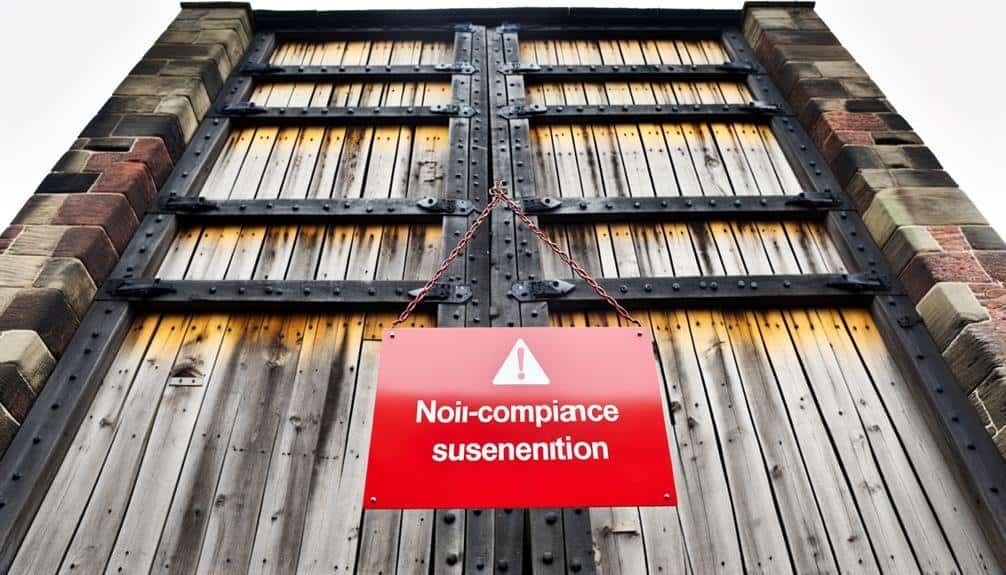What Is a Non-Compliance Suspension?
Non-compliance suspensions may sound severe, but they serve a significant purpose in maintaining order and accountability.
So, what exactly is a non-compliance suspension? It's a disciplinary action taken when an individual fails to adhere to the rules and regulations set forth by an organization or institution.
But why do these suspensions occur, and what are the consequences? Stay tuned as we delve into the reasons behind non-compliance suspensions, the process of imposing them, and how to avoid finding yourself on the receiving end.
Key Takeaways
- Non-compliance suspension refers to the temporary revocation of privileges or rights due to a failure to adhere to rules or regulations.
- Non-compliance can occur in various areas, including safety standards, ethical guidelines, and non-payment of fees.
- The impact of non-compliance suspension can be significant, leading to disruptions in operations, compromised safety, and damage to reputation.
- To prevent non-compliance suspensions, organizations should establish robust internal controls, regularly review and update compliance policies, conduct audits, provide training to employees, and establish clear reporting channels to address and resolve compliance issues promptly.
Definition of Non-Compliance Suspension
A non-compliance suspension refers to the temporary revocation of privileges or rights due to failure to adhere to established rules or regulations.
There are different types of non-compliance that can lead to a suspension, such as failure to meet safety standards, violation of ethical guidelines, or non-payment of fees.
The impact of non-compliance can be significant, as it can disrupt operations, compromise safety, and damage reputation.
Suspensions are meant to serve as a deterrent and to enforce accountability. They provide an opportunity for individuals or organizations to rectify their non-compliance and demonstrate a commitment to following the rules.
The duration of a non-compliance suspension can vary depending on the severity of the violation and the actions taken to address the non-compliance.
Reasons for Non-Compliance Suspensions
There are several common reasons for non-compliance suspensions that include failure to meet regulatory requirements, violation of company policies, and refusal to comply with safety protocols. Such suspensions occur when individuals or organizations fail to adhere to established rules and guidelines. The causes of non-compliance suspensions can vary, but they often stem from a lack of awareness, negligence, or intentional disregard for regulations and policies. These suspensions can have a significant impact on individuals and businesses, leading to financial penalties, damage to reputation, and even legal consequences. To provide a clearer understanding, here is a table highlighting some of the common causes and their potential impacts:
| Causes | Impact |
|---|---|
| Failure to meet regulatory requirements | Fines, legal action, reputational damage |
| Violation of company policies | Disciplinary actions, termination of employment |
| Refusal to comply with safety protocols | Workplace accidents, injuries, lawsuits |
It is crucial for individuals and organizations to prioritize compliance to avoid the negative consequences associated with non-compliance suspensions.
Process of Imposing a Non-Compliance Suspension
When it comes to the process of imposing a non-compliance suspension, understanding the steps involved is crucial for individuals and organizations.
The process overview consists of several key steps. Firstly, the non-compliance issue is identified, either through self-reporting or through an external investigation. Once identified, the non-compliance is evaluated to determine its severity and potential impact.
Then, a notification is sent to the individual or organization, informing them of the non-compliance suspension and providing details of the violation.
Following this, a suspension period is imposed, during which the individual or organization is prohibited from conducting certain activities.
Finally, the suspension is lifted once the non-compliance issue has been resolved, usually through corrective actions and compliance measures.
Understanding this process is essential for individuals and organizations to navigate non-compliance suspensions effectively.
Consequences of a Non-Compliance Suspension
The consequences of a non-compliance suspension can have significant impacts on individuals and organizations alike. If you or your organization is suspended due to non-compliance, you may face several financial implications, such as loss of revenue, fines, and legal expenses.
The suspension can lead to a temporary halt in operations, resulting in a decrease in productivity and potential loss of customers. Your reputation may also be severely affected, as a non-compliance suspension can be seen as a lack of integrity and commitment to meeting regulations.
This can lead to a loss of trust from stakeholders, partners, and the public, making it harder to regain a positive reputation in the future. It's essential to take non-compliance seriously to avoid these detrimental consequences.
How to Prevent Non-Compliance Suspensions
To prevent non-compliance suspensions, it is crucial to establish robust internal controls and regularly review and update compliance policies and procedures. By implementing best practices for compliance maintenance, you can minimize the risk of non-compliance and avoid the consequences that come with it. Here are some effective ways to avoid non-compliance suspensions:
| Best Practices | Description | Benefits |
|---|---|---|
| Conduct Regular Audits | Regularly assess your organization's compliance with relevant laws and regulations. | Identify and address any compliance gaps or issues before they lead to suspensions. |
| Provide Continuous Training | Ensure that employees are well-informed about compliance requirements and updated on any changes. | Promote a culture of compliance and minimize the likelihood of non-compliance incidents. |
| Establish Clear Reporting Channels | Encourage employees to report any potential compliance violations or concerns without fear of retaliation. | Promptly address and resolve compliance issues, preventing them from escalating.
Conclusion
So, you've learned all about non-compliance suspensions. It's like a slap on the wrist, but with bigger consequences. You better follow the rules or else you'll find yourself suspended.
And trust me, you don't want that. It's like being stuck in a never-ending loop of paperwork and disappointment.
So, do yourself a favor and stay in line. It's much easier that way.






